“It isn’t the mountains ahead to climb that wear you out; it’s the pebble in your shoe.” -Muhammad Ali
It's been a very busy week here at Starts With A Bang — as most full weeks after vacation often are — but there's a whole lot to look forward to and look back on this past week. Not only did we have a new podcast come out for The Mac Observer, but we also had an overflowing week of stories to cover, including:
- Is the Universe expanding faster than expected? (for Ask Ethan),
- No one, not even Newton or Einstein, was the Muhammad Ali of physics,
- Fly over NASA's greatest-ever view of Pluto (for Mostly Mute Monday),
- Escape from a black hole? Not in this Universe,
- Why dark matter?,
- How do black holes eat? Like Cookie Monster!, and
- Can the Universe expand faster than the speed of light?
Not only do people keep making my book out-of-stock at Amazon (I love it!), but there's a potentially new one in the works; stay tuned! In the meantime, it's onto your slightly belated version of our Comments of the week!
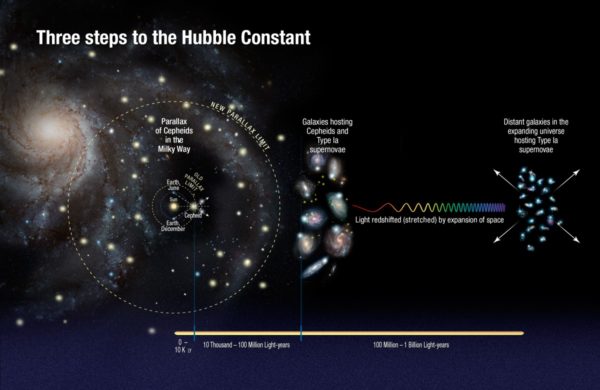 A diagram of the cosmic distance ladder. Credits: NASA, ESA, A. Feild (STScI), and A. Riess (STScI/JHU).
A diagram of the cosmic distance ladder. Credits: NASA, ESA, A. Feild (STScI), and A. Riess (STScI/JHU).
From Denier on the Scienceblogs synopses of a couple of our articles: "It doesn’t seem to be linked correctly."
This is my bad; Scienceblogs has recently "upgraded" their Wordpress to a far worse user interface experience for linking. Because I like to have links open in a new tab, I have a series of extra clicks to make, and if you miss, it undoes the entire link. I missed a couple of times last week, and I'm trying to be more careful now. Tiny things that you'll never know behind-the-scenes, but I'm committed to keeping a good experience for you!
Ali taunting a fallen Sonny Liston in the first round of their second fight. Image credit: AP, via http://interactives.ap.org/2015/ali-liston-fight/.
From Ragtag Media on Muhammad Ali and science: "Leonardo da Vinci is about as close as you could come to an “Ali of Science”.
And to do this you have to appreciate his work as a whole."
There are a whole slew of differing opinions out there, and I've heard the following:
- Newton
- Einstein
- Tesla
- da Vinci
- Galileo
- Maxwell
- Alfvén
- Zwicky
- Boltzmann
and that was just after one article. There's no universally good way to measure greatness, but I'd say rising up to conquer the greatest "problems" facing your field at a time when the field and the "problem-challengers" are especially rich is the closest. After all that, I'd probably go with Einstein, for the fact that coming up with General Relativity was such a herculean leap that novel, new challenges are still being devised, and are still falling at its feet 101 years later. But all of them had demons they couldn't conquer. Honestly, I feel Ali did, too; after the final Frazier fight, perhaps both of their finest hours, neither man was never the same.
 The dark (night) side of Pluto, showcasing layers of atmospheric haze and possible low-lying clouds (foreground) nearer to the surface. Image credit: NASA/JHUAPL/SwRI.
The dark (night) side of Pluto, showcasing layers of atmospheric haze and possible low-lying clouds (foreground) nearer to the surface. Image credit: NASA/JHUAPL/SwRI.
From Denier on NASA mission classes: "This is a spectacular display of the old “Faster-Better-Cheaper” mission philosophy. New Horizons came in under $800 million. Kepler, even with its ongoing study, is still under a total of $600 million. The Opportunity rover is at roughly $400 million."
And there's a lot to be said about that. You see, there's always a trade-off when you do anything between those three goals: fast, good and cheap. "Pick two," is the resolution I've heard. In the late 1990s, NASA committed to "faster, better, cheaper" as the strategy, and what they found is that they could do things faster and cheaper, but that it wasn't better. The flagship class of missions -- the Apollo-class missions, the Hubble-class missions, the James Webb Space Telescope, WFIRST, future 10-meter-class space telescopes or LISA -- are truly incredible science factories that no fast, cheap mission (or series of missions) can add up to.
Hubble has given us our best optical views on the Universe for more than 25 years, 24 hours a day. Yes, fast and cheap missions can do amazing things, but they're not as good as the ones that are more expensive. Like Louis CK said,
"If you want to get a big thing in life you gotta make a big effort, you gotta try hard, you gotta do things you're not used to doing."
And part of that means investing in the biggest class missions there are. Sure, we can do some amazing things on a (relatively) shoestring budget, but they're not going to be as good as what we could do with a greater investment. We could've done WFIRST for way cheaper, too, but it wouldn't have found as many objects, been able to do spectroscopy, or been able to do all it's planning on doing for planetary science. Tentative launch date: 2024.
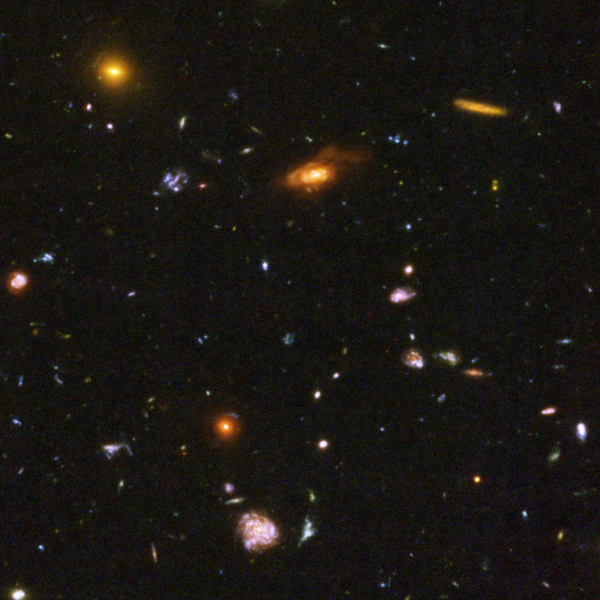 A selection of some of the most distant galaxies in the observable Universe, from the Hubble Ultra Deep Field. Image credit: NASA, ESA, and N. Pirzkal (European Space Agency/STScI).
A selection of some of the most distant galaxies in the observable Universe, from the Hubble Ultra Deep Field. Image credit: NASA, ESA, and N. Pirzkal (European Space Agency/STScI).
From See Noevo on dark energy: "If Dark Energy is changing (e.g. growing “denser”, or growing stronger), what if anything would this mean for the law of the conservation of energy?"
So you are a little late to the party, because you apparently missed the Ask Ethan from a week and half ago where I talked about this exact finding. Now, that find does not indicate that dark energy is increasing in strength, but it could be doing so if it were a scalar field. In particular, if dark energy either had an equation of state where w < -1 (or where it's pressure was greater in magnitude than the energy density), or if dark energy had a w that was changing over time (i.e., a w' that was ≠ 0), we could get a stronger dark energy in the future. It would mean nothing for the global law of conservation of energy, because there is none; energy is not defined in General Relativity. For individual particles on a quantum level (where there is a defined conservation law), it would mean nothing until the final instants before the Big Rip, as energy would still be conserved in all interactions until that moment.
From Wow on the cost/effectiveness ratio of missions: "Maybe the difference isn’t the cost, but the effort spent in making the cost effective and ignoring being “cost effective”, which would tend to lead to cutting corners under the *expectation* that these edge cases aren’t important."
I think it's also important to keep a little perspective in mind. When we prepare for missions, we try and maximize the chance of success of the main mission, and to make contingency plans for achieving as much of it as possible if there are some malfunctions. Philae was a disaster, but Rosetta was a tremendous success. Opportunity is still a hero; Spirit was less so; the Mars Phoenix lander was a disappointment (failing after only a fraction of its mission was performed); and Mars Climate Orbiter and Mars Polar Lander -- both part of "faster, better, cheaper" -- both failed spectacularly. It's easy to point to the biggest successes of that style of missions and go, "SEE!" But the reality is that we're not as successful as we'd like to be in any of our missions; doing something new always comes with challenges we never could have anticipated.
Image Credit: SXS, the Simulating eXtreme Spacetimes (SXS) project (http://www.black-holes.org).
From MP on black holes and entanglement: "Is it possible to shoot an entangled particle into a black hole and observe the local particle?"
Yes. And then you'll learn a tiny bit of information: what one of the spins of one of the particles that went into the black hole was. That, oddly enough, doesn't teach you anything; angular momentum is one of the types of "hair" that we already know black holes have!
Image credit: Tommaso Dorigo of http://www.science20.com/quantum_diaries_survivor/.
From Denier on infinities and theories: "There are those that say physical infinities are just an artifact of the unfinished character of a theory."
What most laypeople don't realize is that pretty much all quantum field theories have infinities in them, and aren't "complete" theories in any way. You like to think that if you can write down all the possible interactions at all loop-orders and sum them up, you'll get the full probability amplitudes (and scattering cross sections) of all the things a particle can do. But you won't; all field theories, if you approach them from this perturbative method, will eventually give you nonsense (infinite) answers. That's because they give you not a converging series as you go to higher and higher loop orders, but an asymptotic series, which diverges past a certain point.
One of the big, big problems for String Theory, by the way, that people really don't like to talk about is this: this "feature" of quantum field theories (i.e., this problem of calculation) gets worse with every extra dimension you add. There is still plenty of room for physics to grow.
From Michael Kelsey on how you measure a galaxy's rotation curve, and its relative redshift or blueshift: "It only works for relatively nearby galaxies, where the angular size of the galaxy is large compared to the telescope resolution (the “point spread function” or PSF, typically a few arcseconds for ground-based telescopes).
In such a situation, you can use a “long slit” spectrograph, which has an aperture limiter to pick out a narrow strip of the object of interest, and get a spectrum along that whole strip (see the Wikipedia article for a cool picture).
To measure rotation, you don’t actually care about the _absolute_ red or blue shift, but rather the _difference_ between the shift at different points across a galaxy image. If the galaxy is rotating, then the left side will have a shift slightly different, and opposite in sign, compared to the right side, with respect to the average or middle value."
I can't believe I haven't talked about this in this level-of-detail before! So to add onto this, here's the picture (for nebulae, not galaxies) that Michael refers to:
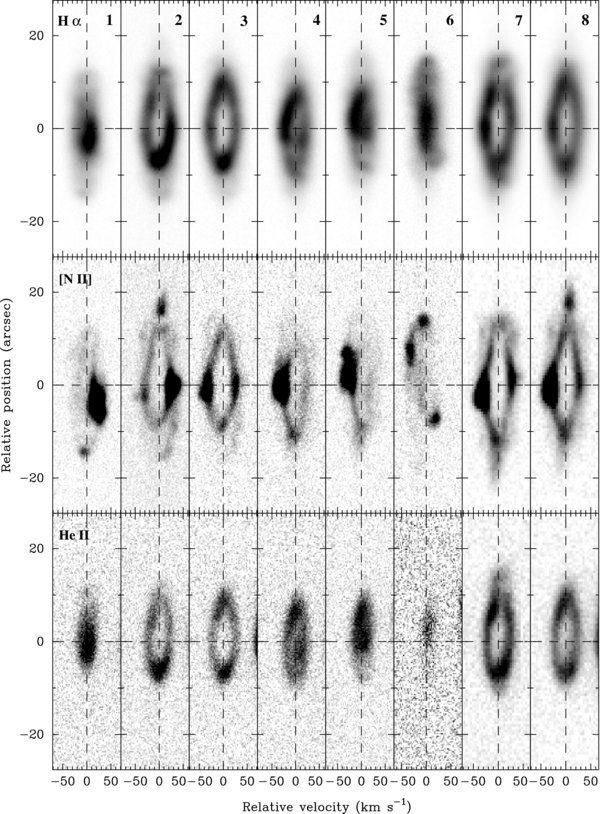 Long-slit spectroscopy for nebula. Image credit: Wikimedia Commons user Larryisgood, under c.c.a.-by-s.a.-3.0.
Long-slit spectroscopy for nebula. Image credit: Wikimedia Commons user Larryisgood, under c.c.a.-by-s.a.-3.0.
For galaxies, we can do this for starlight via standard spectroscopy, we can do it farther out using radio (21-cm) spectroscopy, and we can factor in the tilt of the galaxy as well (because we only measure the edge-on component). We can't measure the rotational speed directly, or for face-on galaxies, because the timescales are too great. But from a snapshot of a rotating galaxy, this rotation curve is a piece of cake. It's no wonder, though, that we didn't really begin to do this in earnest until the 1970s with the work of Vera Rubin: the technology really wasn't there yet!
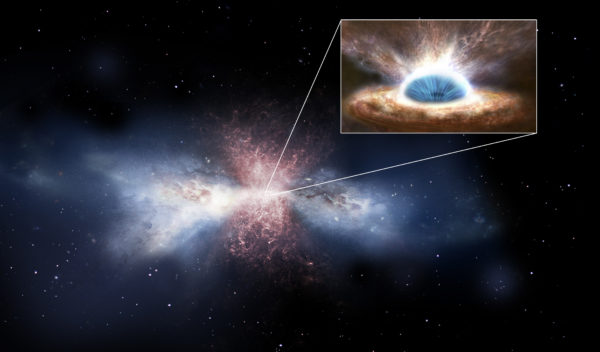 This artist’s rendering shows a galaxy being cleared of interstellar gas, the building blocks of new stars. Image credit: ESA/ATG Medialab.
This artist’s rendering shows a galaxy being cleared of interstellar gas, the building blocks of new stars. Image credit: ESA/ATG Medialab.
From Omega Centauri on how black holes eat: "[I]f you consider an isolated particle interacting with a BH, either it goes into the event horizon, and vanishes without emitting radiation, or it swings around it, and leaves with the same kinetic energy (relative to the BH) that it arrived with. But matter in bulk, is going to suffer from extreme tidal distortion, which allows it to gain energy. But we still have to conserve overall energy (mass-energy), so some matter must be swallowed or at least left in a more tightly bound orbit, in order for other matter to radiate and/or be thrown out at high velocity."
Think about this: a black hole is extremely massive but extremely compact. Its event horizon is tiny compared to masses you're used to. The Earth, for example, is 6371 km in radius and has a mass of 6 x 10^24 kg. If the Earth were a black hole, it would have the same mass but be 0.44 cm in radius, or more than 100000 times smaller in all three dimensions. Most of the space dust passing by our vicinity don't even collide with our atmosphere; they get gravitationally "slingshotted" out elsewhere. Now scale that up: every factor of 10 in mass gives you another factor of 10 in radius for a black hole.
Image credit: Wikimedia Commons user Lunch, of a 2-D projection of a Calabi-Yau manifold, one popular method of compactifying the extra, unwanted dimensions of String Theory.
From Richard Fraser on growing dimensions: "Suppose for a moment that the 1st dimension segways, a line that on 1 end splits into the second, which explodes into a 3rd dimension, the creation of the 3rd creates motion and distance. If the Big Bang was the birth of the 3rd dimension would universal expansion be the 3rd dimension pursuing time at its maximum dimensional expansion rate? It’s clear working backwards that higher dimensions must be built off lower dimensions, so it indicates that lower dimensional movement gives rise to the dimension above it by reaching its maximum dimensional expansion limit."
It actually works the other way, in most physical Universes we can construct: it's very difficult to make a new dimension "spring" out of a lower-dimensional space. How would you turn a piece of paper into a three-dimensional solid, for example? You can crumple it up into a ball, but all you'd have, to an observer on that two-dimensional paper, was a topologically defective sheet of paper with kinks and discontinuities. Instead, it's easier to have a dimension disappear as it evolves over time, while others grow. A fun example -- first worked out by Steve Detweiler (R.I.P.) and Alan Chodos -- was to take a five-dimensional Kasner metric and watch it evolve into a four-dimensional expanding Universe.
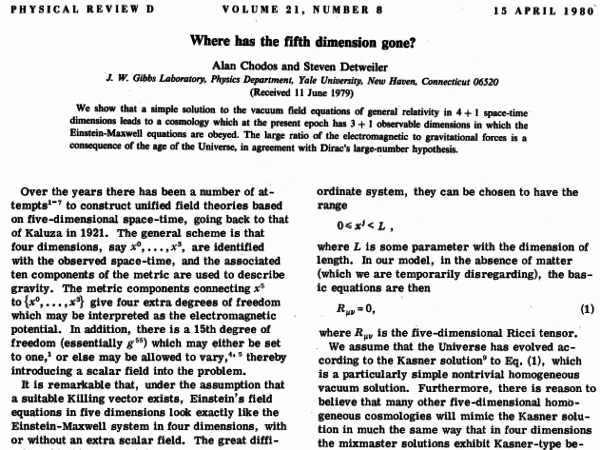 Image credit: Chodos and Detweiler (1980), retrieved from http://www.physics.ufl.edu/~det/1980%20Chodos%20Det%20Where%20has%20the….
Image credit: Chodos and Detweiler (1980), retrieved from http://www.physics.ufl.edu/~det/1980%20Chodos%20Det%20Where%20has%20the….
Steve was the guy who taught me GR back in grad school, and I had the opportunity to meet Alan Chodos -- an excellent writer and communicator -- back in 2004 or so. This is a result that's periodically forgotten and periodically re-found again, but always interesting. Extra dimensions are messy but fun, and a useful but problematic tool for theorists. Going down is easier than going up!
 Public domain timelapse photo by flickr user comedynose (Pete), illustrating fast, relativistic motion. Image retrieved via https://www.flickr.com/photos/comedynose/23696582553.
Public domain timelapse photo by flickr user comedynose (Pete), illustrating fast, relativistic motion. Image retrieved via https://www.flickr.com/photos/comedynose/23696582553.
And finally, from G in an effort to put me out of a job: "The answer to this should be obvious to regular readers.
Spacetime itself is what expands, and at the difference between two sufficiently distant points, the rate of expansion is faster than c. This we observe in the red-shift and the progressive loss of distant galaxies from view."
"Can the Universe expand faster than the speed of light?" That was the question. And the answer is exactly as G claims. The tough part for most people (non-regular-readers of this blog) to wrap their heads around is that the expansion of the Universe is a rate, but it's an unusual rate: a speed-per-unit distance. In our Universe's case, it's around 70 km/s/Mpc. But the speed of light is 300,000 km/s, so if you're more than 300,000/70 = 4300 Mpc away (or about 14 billion light years), you'll appear to recede faster than c. The technical details of the expansion are less than 5% different from this, so this easy rule-of-thumb gets you 95%+ of the way there!
Thanks for a great week, and let's start the next one imminently!



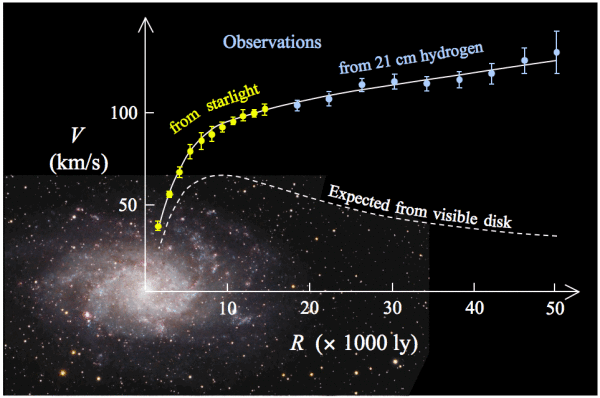
There's a difference between making the cost of something effective and making something cost effective.
Apollo 13 (and earlier) would have made the high cost of the missions more effective if they'd used more standardisation of parts (such as air scrubber filters).
But if they'd not OVER ENGINEERED the missions, which was opposite to making it "cost effective", the mistake that happened would have turned into disaster, instead of a movie with a loud soundtrack...
Worse, "cost effective" really is a euphemism for "cheap".
And, yes, the universe gives you the unexpected right when you're not expecting it, but if you're not making too much of the cost cutting, you can build in enough obsolescence to meet many unexpected scenarios.
It's also *easy* to critique as a bad decision something that was decided and later turned out to be to have been unwise. See ESA and the comet probe. Knowing it was going to fail with solar panels, the expense (and elapsed time getting it, if indeed it were allowed to be bought at all) cutting the expense is obviously a bad move.
But more science was still possible to do (just not until the comet got closer to the sun) because the mission weight was lower by the decision.
So was it a bad or good decision?
IMO it would have been a bad one if the decision was done to meet a budget. But to meet mission goals, even if it hadn't worked at all, would have been at least defensible as being as good as you could expect.
To answer "Who is the Ali of ..." you really need to say what is "the Ali" you refer to.
When you leave it open, anyone can make up what they think the feature to look for is, and then find a fit to another personage they feel have the same feature.
To me, it would be the work OUTSIDE boxing he did, the method of living, not the precision of technique in the ring. Which really puts you into the early stages of science where there was little enough to science that it could include the efforts well outside science. So 18th and 19th century.
Modern science maybe Feynman (because of the work done in other sciences outside physics specialty) or Sagan (for his work in explaining and proselytizing science, over his accomplished work in the field).
Question: is your use of the word "in" differently in two different posts (one to refer to things that pass the event horizon of a BH, and one to refer to things that haven't yet passed that point) the nail in the coffin of all modern science, or just the nail in the coffin of cosmology and evolution?
@eric #3: Does your use of the word "in" in your expression "the nail in the coffin" refer to a recently deceased nail being buried _in_ a coffin, or to a woodworking fastener being hammered _into_ the lid and sidewall of a coffin?
“…we could get a stronger dark energy in the future.
It would mean nothing for the global law of conservation of energy, because there is none…”
I learned something new today!
I learned Ethan thinks there is no law of the conservation of energy.
..........
“energy is not defined in General Relativity.”
Then, hopefully, GR never addresses energy or makes any claims about energy, including dark energy.
I sure hope it doesn’t.
Sn, the only thing more amusing than you always being wrong is how easy it is to illustrate that you are wrong. (The dishonesty is just as constant.)
http://www.preposterousuniverse.com/blog/2010/02/22/energy-is-not-conse…
“We can’t measure the rotational speed directly, or for face-on galaxies, because the timescales are too great.”
I’m assuming the rotational speed of galaxies is different from the velocity of galaxies.
You say you can’t measure galaxies’ rotational speed, but apparently you CAN measure their velocities. Because in your “Why Dark Matter” article, you include a chart with the description:
“The velocities of the galaxies in the Coma Cluster, from which the total mass of the cluster can be inferred to keep it gravitationally bound.”
I guess I’m not clear on the difference though, and why measuring rotational speed is so sensitive and problematic. Measuring velocity doesn’t appear to have such issues, no matter how far away the galaxies are.
For as you say:
“You know that if you look out at a galaxy, on average, the farther away that galaxy is situated from us, the faster it appears to be receding from us. Galaxies in the Virgo Cluster, some 50-to-60 million light years distant, move away from us at some 1200 km/s on average; galaxies in the Coma Cluster, some 330 million light years away, appear to recede from us at 7000 km/s.
The farther away we look, the faster these galaxies and clusters appear to recede… we can see that the farther away we look, the faster these galaxies are moving away from us.”
@4: oooh, you found a flaw in my argument. That must mean the Earth is 452 years old.
Quoth S.N.:
1. You've already been informed that energy isn't conserved in GR.
2. As pointed out by Dean, neither does Sean Carroll. Why don't you go start sqeeing over there? Or look up Baez's explanation?
@Dean
I'd say the tales of S.N. composed by RIgular 'gaist' are much more amusing. This is a later installment, but I can't compile them all in order at the moment.
*blink*
This does remind me of a story, though: A long time ago, as an enthusiastic greenhorn, I got a call* from an author** to go over some proofs. We discussed the changes, and I convinced him of some and reverted others. The one thing that really stands out, though, was his pointing out that "recessional velocity" is really a hypercorrection.
* No, really, that long ago. I once had to call CTIO myself. And there are still two accepted Eggen papers that were supposed to have had the queries checked posthumously.
** I almost want to say SvdB, but it doesn't quite feel right.
@Deceiver #7: "I’m assuming the rotational speed of galaxies is different from the velocity of galaxies."
Duh. Is the rotational speed of a merry-go-round the same as it's velocity as it is pulled along on a flatbed trailer?
I suppose it's possible that you really are as blindingly stupid as you pretend you are, but I doubt it. Most of the time, you're just pretending ignorance in order to further your Master's program.
To Mikey the SLACer #11:
As I brought up above,
Why do ‘great timescales’ prevent us from measuring galaxies’ rotational speed, but do NOT prevent us from measuring galaxies’ velocity?
Also, what would the velocity of the merry-go-round being pulled along on a flatbed trailer tell you about the MASS of that merry-go-round?
(It must tell you a lot, because, you know, “The velocities of the galaxies in the Coma Cluster, from which the total mass of the cluster can be inferred to keep it gravitationally bound.”)
What would it tell you?
Observing it go round without falling apart tells you that the forces holding the mass-bits of the merry-go-round together are stronger than the forces trying to push those mass-bits apart.The same is true for galaxies, but gravity is far weaker than the electromagnetic force.
@Deceiver #12: Well, maybe you really are that stupid, or at least consistent in your deception.
"Great timescales" prevent us from measuring _face-on_ galaxies' rotations (you even quoted that qualifier originally, but have conveniently and wilfully ignored it subsequently). Why? Because it takes galaxies about 200 million years to undergo a single rotation (i.e., a typical star's orbit), and if we see the galaxy face on, we can't use spectroscopy to measure the stars' differential motions on either side of the galaxy. We could only (hypothetically) measure their motion across our field of view, which would require tens of millions of years.
The recessional velocity of a galaxy tells you nothing about its mass. Just stupid, or wilfully ignorant?
The Coma cluster, is a cluster of galaxies. Zwicky used his spectroscopic measurements of their motion to compute the mass holding the _cluster_ together, not the individual galaxies. Just stupid, or wilfully ignorant, to conflate the two when it was clearly explained?
To eric #13:
Me: “what would the velocity of the merry-go-round being pulled along on a flatbed trailer tell you about the MASS of that merry-go-round?”
You: “Observing it go round without falling apart tells you that the forces holding the mass-bits of the merry-go-round together are stronger than the forces trying to push those mass-bits apart.The same is true for galaxies, but gravity is far weaker than the electromagnetic force.”
You're not answering the question.
The question was NOT about the rotational speed of the merry-go-round.
It was about what the *velocity* of the merry-go-round, as it’s being pulled along on a flatbed trailer, tells you about the *MASS* of that merry-go-round.
Perhaps another way of saying it is: What does the speed of the trailer tell you about the mass of its cargo?
SN @15: oh, well Michael already answered that; nothing.
To Mikey the SLACer #14:
““Great timescales” prevent us from measuring _face-on_ galaxies’ rotations (you even quoted that qualifier originally, but have conveniently and wilfully ignored it subsequently). Why? Because it takes galaxies about 200 million years to undergo a single rotation…”
I find it odd that the great timescale prevents us from calculating the rotation speed of a face-on galaxy.
Great timescales don’t seem a hindrance in other areas of science.
For example, the great timescale of the decay of uranium-235 doesn’t prevent us from calculating its decay speed (i.e. ~700 million year half-life).
…………
“The recessional velocity of a galaxy tells you nothing about its mass. Just stupid, or wilfully ignorant?”
I hope neither.
But then why would Ethan in his “Why Dark Matter” article include a bar-chart with the description:
“The velocities of the galaxies in the Coma Cluster, from which the total mass of the cluster can be inferred to keep it gravitationally bound” ?
Also, Mikey…
“Deceiver…in keeping with your Master’s program.”
Two simple questions:
1) Who do you think my “Master” is?
2) Do you believe this “Master” actually exists, is a real being?
You'd be better off hoping for a pony.
Take it away, Fritz.
SN:
The number of galaxies we can see from Earth is extrapolated* to be on the order of hundreds of billions, or about 1E11. Of course the number we can observe for scientific measurement at any given time is far smaller. In contrast, a sub-gram sample of uranium has about 1E20 atoms in it. Then of course there's the fact that lab grade alpha spectrometers are a lot more numerous and a lot cheaper to buy and operate than high-end telescopes, making the quantity mismatch probably several of orders of magnitude larger than even that. In short, we can do many orders of magnitude more measurement on uranium atom decay than we can galaxy rotation.
Curious though that you cite that as technique for comparison. Don't you YECers deny that looking at decay rates today tells us anything useful about the past? You have this idea that poof! decay rates changed via God some time around 1-2000 BC or so. So really, what's your problem with accepting poof! God added some dark matter to galaxies to stabilize their rotation. I mean if you're going to invoke several deus ex machina miracles to make your idea work, what's one more?
"...the great timescale ..."
Hasn't the congenital idiot continually stated that knowing long time spans in science isn't possible? Now one is part of an "argument" he raises?
The lack of intellect is strong with that one.
To eric #20:
“In short, we can do many orders of magnitude more measurement on uranium atom decay than we can galaxy rotation.”
So, the problem is NOT a lack of time or of technology, but rather of not having enough *copies* of the technology (i.e. “high-end telescopes” plural) and *taking the time* to use them?
But then, why did Ethan say “We can’t measure the rotational speed directly, or for face-on galaxies, BECAUSE THE TIMESCALES ARE TOO GREAT”?
…………..
“Curious though that you cite that as technique for comparison. Don’t you YECers deny that looking at decay rates today tells us anything useful about the past?”
Just using the data I read here and elsewhere, and asking questions about it. Kind of like a good scientist might!
“You have this idea that poof! decay rates changed via God some time around 1-2000 BC or so. So really, what’s your problem with accepting poof!”
You have this idea that poof! the behavior of chemicals and chemical processes changed via [whatever] some time around 4 billion years ago and poof! “Life takes hold!” So really, what’s your problem with accepting poof!
I'm going to try to just finish this one off. Yes, Gavazzi et al. (21 cm Arecibo data)* measured recession velocities. One more time (emphases added):
The virial theorem** also works with velocity dispersions: $latex GM/\Delta r \sim \Delta V^2$. It's the width of the distribution in this case.
* Having finally skimmed the paper, I'm not crazy about the choice of figure, as it's aimed at their question whether there's a bimodal mass distribution and thus has the extra curve.
** About the simplest explanation I could find. Moronic cherry-picking would likely ensue, were I not "on" S.N.'s even more moronic "Do Not Call/No Fly list."
^ The figure legend is also poorly edited, with "open" being used for "hatched" and "shaded" for "crosshatched." That wasn't one of Beth Garrison's, to be certain.
"Kind of like a good scientist might"
Since a good scientist, or any honest person who is not a scientist, would ask questions in the hoperson of learning something, but you ask simply to say "I don't believe that." - you are not asking as a good scientist might. You are asking in bad faith.
These are all interrelated factors: you can solve the problem with (a) one sample, one detector, long time. Or (b) one sample, highly detailed detection, shorter time (this one won't work for uranium decay). Or (c) many samples, detector on each, shorter time. But these solutions aren't equally available to every problem of detecting a 'slow' phenomenon.
Because, as I already noted, the cosmology community doesn't have the luxury of studying 1E20 galaxies the way the nuclear community does atoms.
Oh no, not at all. We expect that the rules and physics were exactly the same, which is why we study the formation of organic compounds under various conditions. If we assumed (like creationists) that 'the behavior of chemicals changed', then no experiment we could do would be relevant to supporting or ruling out our hypothesis (like creationists), and we would no longer be doing science (like creationists).
Do you really, seriously, think that abiogenesis claims that 'the behavior of chemicals changed' some time in the past? If so, you have wildly misunderstood it.
It's just bastardized baraminology. "Chemicals" and "life" are different kinds, dammit!
@Ethan wrote:
While we may get some nice images out of WFIRST, its currently structured development is a boondoggle. The NRO donated, completely free of cost, two KH-11 telescopes roughly the size of Hubble. NASA should have bolted on the best cameras they had at the time and strapped them to the first Delta IV headed up.
But noooooooo. That makes too much sense and NASA is part of the government, so they invented some study showing how WFIRST would be even better if they designed a single, smaller telescope from the ground up.
Of course the development of the brand new platform is expensive, but because JWST is also expensive and soaking up all the money, WFIRST keeps getting kicked back. There is no way it will get first light by 2024. If they had gone with the KH-11's both would be functional now, each with twice the resolution and 4 times the light gathering ability of the not even built yet WFIRST design.
Speaking of the NASA projects put up during the few years NASA was making cost effective decisions, did you hear they're thinking about having Dawn probe leave Ceres and check out some other stuff in the asteroid belt? Dawn was sub-$500 mil, and apparently still has enough gas in the tank to do some more science.
To eric #26:
Me: “You have this idea that poof! the behavior of chemicals and chemical processes changed via [whatever] some time around 4 billion years ago and poof! “Life takes hold!””
You: “Oh no, not at all. We expect that the rules and physics were exactly the same…Do you really, seriously, think that abiogenesis claims that ‘the behavior of chemicals changed’ some time in the past? If so, you have wildly misunderstood it.”
Let’s review some facts:
1)The elements and chemicals and chemical processes that existed for the first alleged 9.8 BILLION YEARS of the universe produced NO LIFE that we know of.
2)After those alleged first 9.8 BILLION YEARS, the elements/chemicals/chemical processes allegedly "suddenly" produce on planet earth the only life we know of in the alleged 13.8 billion year history of the universe.
3)In the thousands of years of human history, no elements or chemicals or chemical processes have been observed to produce life, whether in nature or in the laboratory.
Facts, right?
I think that, in toto, this would qualify as a CHANGE, even a sudden change, in the behavior of elements/chemicals/chemical processes.
I think it may be a paragon of POOF!
Oh, G-d, this is side-splitting. Bye-bye, hormones, it's pure vitalism from now on.
Maybe someday Ethan will explain the caption under one of the charts in “Why Dark Matter”:
“The velocities of the galaxies in the Coma Cluster, from which the total mass of the cluster can be inferred to keep it gravitationally bound.”
I kind of thought that chemical processes sort of were responsible for everything to do with life and they are observed doing that every freakin' day. We need an alleged definition of sudden if this alleged discussion is to proceed.
AFAIK, nobody on this website is asserting this; you're arguing with the scientist in your head here, not us. I think most of us would say we have no evidence of life elsewhere, but we would also say that our ability to detect it elsewhere is fairly limited.
Depends on what you mean by suddenly. Neither evolution nor abiogenesis demands or claims that complex cell-based life evolved from basic organic chemicals in a matter of years, decades, or heck even a million years.
Well sure. That's a perfectly reasonable expectation for several reasons. Modern biology is only a couple hundred years old; a bit young to be claiming that if we haven't unlocked all the secrets of life, we never will and we should just give up. Another: we aren't even sure about the environment in which life originated (but what we know says: not like Earth today). Another: with a several billion year head start, its reasonable to expect current life to be highly successful at eating any simple, organic replicator competitors. Another: since what we know about the environment is 'not like Earth today,' we wouldn't expect similar processes to occurr today.
You're absolutely wrong. A change would be saying electron shells were different back then. Or formation enthalpies of compounds were different. Or half-lives were a thousand times shorter. Things like that. Science rejects such claims based on empirical observation. We do not make such claims. You're projecting here, SN, and pretty badly too: attributing to science the worst apologetics fallacies of your own religious thinking. YOU make such claims. We don't.
To eric #32:
Me: “1) The elements and chemicals and chemical processes that existed for the first alleged 9.8 BILLION YEARS of the universe produced NO LIFE that we know of.”
You: “AFAIK, nobody on this website is asserting this…”
So, then, they ARE asserting that the elements and chemicals and chemical processes that existed for the first alleged 9.8 BILLION YEARS of the universe DID produce LIFE that we know of?
That would be news to me.
I thought I’ve read for a long time now that scientists say life on earth (the *only life we know of*) began about 4 billion years ago; that there was no life before that (i.e. none in the preceding alleged 9.8 billion years).
................
Me: “2) After those alleged first 9.8 BILLION YEARS, the elements/chemicals/chemical processes allegedly “suddenly” produce on planet earth the only life we know of in the alleged 13.8 billion year history of the universe.”
You: “Depends on what you mean by suddenly.”
How about “instantaneously”?
Like less than a trillionth of a second?
Because that would be the fact.
It’s like digital, man. It’s on or off, a 1 or a 0, alive or not,
*and nothing in-between*.
It’s kind of like that joke-saying:
“There’s no such thing as being a little bit pregnant.”
....................
Me: “I think that, in toto, this would qualify as a CHANGE, even a sudden change, in the behavior of elements/chemicals/chemical processes.”
You: “You’re absolutely wrong… Science rejects such claims based on empirical observation.”
Well then science should reject abiogenesis, because science has no empirical observation of abiogenesis (i.e. elements/chemicals/chemical processes producing life).
@Deceiver #34: You wrote, "[eric]: “AFAIK, nobody on this website is asserting this…” So, then, they ARE asserting that the elements and chemicals and chemical processes that existed for the first alleged 9.8 BILLION YEARS of the universe DID produce LIFE that we know of?"
You're really not good at basic logic, are you? "Not asserting a negative" is NOT the same as "asserting a positive." That you want to claim it is just reveals your willfully deceptive practices.
Regarding the formation of life, you wrote "[eric]: “Depends on what you mean by suddenly.” How about “instantaneously”? Like less than a trillionth of a second? Because that would be the fact." Nope. Not at all. It's a long term, gradual process with many intermediate stages, which various investigators may or may not choose to label "alive." The straw man you construct is demonstrably false, and just reveals your willfully deceptive practices.
To Mikey the SLACer #35:
“You’re really not good at basic logic, are you? “Not asserting a negative” is NOT the same as “asserting a positive.” That you want to claim it is just reveals your willfully deceptive practices.”
Let’s play a perhaps simpler game.
Let’s play “Is this a statement of fact?” for this:
1)The elements and chemicals and chemical processes that existed for the first alleged 9.8 BILLION YEARS of the universe produced NO LIFE that we know of.
Is that a statement of fact, Mikey?
If not, why not?
………………….
"Nope. Not at all. [The formation of life is] a long term, gradual process with many intermediate stages, which various investigators may or may not choose to label “alive.” The straw man you construct is demonstrably false, and just reveals your willfully deceptive practices.”
Straw man?
Hey, how about a little fire, scarecrow?
How about YOU show how the proposition - that life comes into being instantaneously – is “DEMONSTRABLY false”?
Please DEMONSTRATE *how and where* something is or can be 50% alive or 5% alive.
Once you do, maybe then I’ll think YOU are not “willfully deceptive.”
Are viruses alive? Is RNA alive?
Anyway,
How many fυcking times has this been explained to you? What part of the virial theorem do you refuse to understand?
Moreover, what's with your freakish insistence on having Ethan personally, ah, "service" you? Pretending at failure to notice that he doesn't actively comment here is purest imbecility. Why don't you go try at Forbes?
SN @36: its correct to say '...that we know of." Its a matter of confidence. I could be wrong about others, but I don't think anyone is asserting with high confidence that there was no life anywhere in the universe before it appeared on Earth. Do you understand that point?
Re: timing. If you want to define life, then claim that according to your definition it didn't exist at one point and then did at another, fine. That's not remarkable or miraculous at all, it's just a reflection of the definition you've chosen. OTOH, if you're trying to imply that mainsteam science claims complex cellular life sprang instantaneously and fully-formed from methane etc., no, it doesn't claim that. Which are you trying to argue? That defining "life" allows us to define a specific moment when it occurs? Or that abiogenesis claims some fully formed cellular life came together in one fell swoop?
Sigh. We don't make the claim that physical laws were different in the past. That's the claim you made that I object to. Are you going to continue to assert that we do, or are you going to admit that we don't?
Yes, S.N. has conceded that his trolling process requires something "simpler" than "basic logic." Well played.
To eric #38:
"Sigh."
I’ll say to you what I said to Mikey:
1)How about YOU show how the proposition – that life comes into being instantaneously – is “DEMONSTRABLY false”?
2)Please DEMONSTRATE *how and where* something is or can be 50% alive or 5% alive.
……………..
Me: “science should reject abiogenesis, because science has no empirical observation of abiogenesis (i.e. elements/chemicals/chemical processes producing life).”
You: “Sigh. We don’t make the claim that physical laws were different in the past. That’s the claim you made that I object to. Are you going to continue to assert that we do, or are you going to admit that we don’t?”
You said that “science rejects such claims BASED ON EMPIRICAL OBSERVATION.”
In other words, science rejects the claim that elements/chemicals/chemical processes worked differently in the past, based on how science has observed elements/chemicals/chemical working now.
So, IT FOLLOWS THAT that science SHOULD reject the claim that elements/chemicals/chemical processes produced life in the past, based on how science has observed elements/chemicals/chemical NEVER producing life now.
Surely you follow, fellow?
OK, while S.N. was studiously ignoring the virus question ad nauseam, I was reminded of something analogous.
Are endospores "alive," S.N.? Tetanus doesn't come from nowhere, after all.
It may not be; it depends on your definition of life. Like I said before. What I'm trying to avoid is the misunderstanding or misrepresentation of abiogenesis as some form of saltationism, because it isn't that.
This is simply an example. If we define life as 'having a working metabolism,' where metabolism means something like 'a cascading sequence of organic reactions that extract energy from fuel,' then as Narad pointed out, dormant seeds or spores (i.e. plant matter that undergoes no chemical reactions at all for long periods of time) would be something that was alive 50% or 5% of the time. That's certainly not the only definition of life one could use, and I'm not even claiming its the best. But what is true is that your argument ad absurdem only works as long as you keep "life" vague and ill-defined. If we sit down and agree on a definition for it, then more than likely the questions of when a collection of atoms can be counted as 'alive' and whether 'half alive' as a concept is even a logical possibility start to have reasonable and rational answers.
Nope. An unobserved phenomena consistent with physical laws is quite a different thing than a claim that physical laws themselves have changed. The former is like claiming "There's a robin in my neighbor's yard" while the latter is like "I can flap my wings and fly like a robin." One can very rationally accept the former while rejecting the latter.
Now I've answered three of your questions, including one of your follow-on question to a question of mine that you didn't deign to answer. So now please answer it: we don’t make the claim that physical laws were different in the past. That’s the claim you made that I object to. Are you going to continue to assert that we do, or are you going to admit that we don’t?”
To eric #42:
Me: “1) How about YOU show how the proposition – that life comes into being instantaneously – is “DEMONSTRABLY false”?
You: “It may not be; it depends on your definition of life. Like I said before. What I’m trying to avoid is the misunderstanding or misrepresentation of abiogenesis as some form of saltationism, because it isn’t that.”
Actually, abiogenesis *could* be considered as some form of saltationism; it depends on your definition of life.
…………….
Me: “2) Please DEMONSTRATE *how and where* something is or can be 50% alive or 5% alive.”
You: "If we sit down and agree on a definition for [life], then more than likely the questions of when a collection of atoms can be counted as ‘alive’ and whether ‘half alive’ as a concept is even a logical possibility start to have reasonable and rational answers.”
How about if, for now, we use the definition of life employed by all the people who say life on earth began about 4 billion years ago?
…………….
Me: “So, IT FOLLOWS THAT that science SHOULD reject the claim that elements/chemicals/chemical processes produced life in the past, based on how science has observed elements/chemicals/chemical NEVER producing life now.”
You: “Nope. An unobserved phenomena consistent with physical laws is quite a different thing than a claim that physical laws themselves have changed.”
How can 'elements/chemicals/chemical processes-producing-life' be considered consistent with physical laws if such has NEVER been observed in nature and NEVER been demonstrated in a lab?
I don’t see how it can be considered consistent.
You can't be "consistent with" something that doesn't exist or has never been detected.
…………….
“So now please answer it: we don’t make the claim that physical laws were different in the past. That’s the claim you made that I object to. Are you going to continue to assert that we do, or are you going to admit that we don’t?”
Perhaps it’s semantics.
I’ll continue to assert that you believe SOMETHING happened 4 billion years ago that did NOT happen before that and has NOT happened since (or at least since humans started observing things thousands of years ago.).
"(you even quoted that qualifier originally, but have conveniently and wilfully ignored it subsequently)."
It is the modus operandi of the ignorant trying to get their mythology treated as seriously as their bruised ego demands everyone do.
ISIS are exactly the same.
"You have this idea that poof! decay rates changed via God some time around 1-2000 BC or so"
One rather wonders WHY it would bother to do so, however.
I find it insultingly arrogant of these specks of spittle to demand, DEMAND!, of any creator that they MUST ONLY exist so as to make the aforementioned lickspittle the entire point of creation.
They even insist that they and ONLY they "know" what the unknowable wants done and how strait the path it must have taken.
After all, they have a book.
Just like Harry Potter.
Please remember when the fundamentalists say "as far as I know", they DON'T KNOW SQUAT.
Such claims can be completely ignored.
See nowt will insist on seeing nowt because otherwise they're afraid that their base desires will be unleashed. In SN's case this may be an actual risk, rather than merely a fear of the worst case scenario.
Hence it would be better to make the contradictory claims promoted to your mind by SN's deliberate (and highly cherished) ignorance and address them to anyone NOT completely up their own anus who happens to read and doesn't have the knowledge you do.
Any kicking done to the richly deserved credulous moron would be bonuses you can apply as you see fit.
Can you point me to it? I don't think mainstream science has a single, consensus definition. But I could be wrong about that; if you know of some pan-discipline formally agreed-upon definition I'm unaware of, feel free to tell me what it is.
This is pretty crazy, even for you. Are you claiming that any chemical reaction we can write down but haven't seen happen is inconsistent with the laws of physics? I'm fairly certain no human has ever (even indirectly, via instruments) seen Hs + 2O2 -> HsO4...I'm also fairly certain no physicist is going to claim that reaction is inconsistent with the laws of physics. That would be silly.
Its not semantics, its a fairly simple point: mainstream concepts of abiogenesis do not claim or depend upon any change in the laws of physics or chemistry.